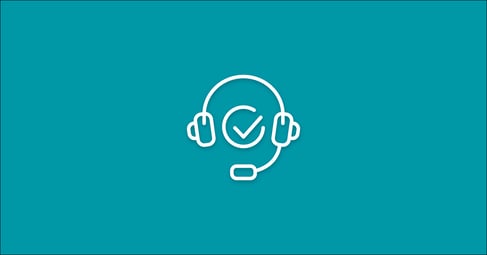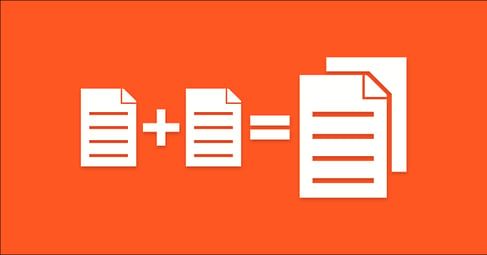Written By:
Kelsey Miller
With rapid changes in technology and individual preference, the way that people make decisions of all sizes is evolving faster than ever. Consumers use their smartphones and the internet to research virtually every decision they face, from where they should order lunch, to which car they should buy—to which college they should attend and which degree they should earn.
Simply put, deciding to earn a college degree is one of the most consequential decisions that many individuals will make over the course of their lifetime. There’s little doubt that these people are devoting a lot of time to researching their opinions.
As an enrollment marketer, it’s essential to understand how prospective students are going about making these decisions so that you can craft a marketing strategy that is relevant and impactful.
The key to keeping track of the ever-changing needs and goals of prospective students? Creating thoughtful, data-backed student personas.
Key Takeaways
Define ideal students: Build data-backed, semi-fictional profiles for each target applicant group.
Clarify persona details: Capture name, bio, demographics, goals, challenges, info sources, and quotes.
Guide enrollment strategy: Use personas to shape messaging, content plans, funnels, and boost applications.
Segment by journey type: Create variants for high-school seniors, transfers, second-career seekers, learning parents, and working professionals.
Iterate continually: Revisit and refine personas as research reveals new motivations and behaviors.
What are student personas?
Student personas are semi-fictional representations of your ideal student, and they are a key part of inbound marketing for higher education institutions. When thoroughly researched and executed well, student personas can help enrollment marketers refine their messaging, inform their content strategy and inspire new ideas, create effective conversion funnels, and—most importantly—increase applications.
A thorough student persona will often include:
- A fictionalized name
- A short summary or biography
- Demographic information such as age and location
- Primary goals and challenges
- Common sources of information
- Relevant information and quotes from student persona interviews and other research
Depending on the specific programs you’re tasked with supporting, you’re likely to encounter several different types of students that you will need to develop personas for. Below, we’ve curated five examples of student personas to help you get started creating or refining your own. Don’t forget to download our free student persona toolkit to help you organize your efforts.
Free Toolkit – Create Student Personas For Your School
Although the examples below are more generalized than is typical, it’s often beneficial to tailor each of your university’s persona to a specific degree program in order to fully understand your ideal student’s goals and motivations. Also keep in mind that your research is likely to uncover a wealth of information about your ideal students, and your personas will likely be much more specific and detailed than the following examples.
College Student Persona Examples
1. The High School Senior
One of the most common audiences for enrollment marketers to target are the traditional aspiring undergraduates. Generally speaking, these are high school juniors or seniors who are actively engaged in the college search and looking to pursue a bachelor’s degree in their desired field of study.
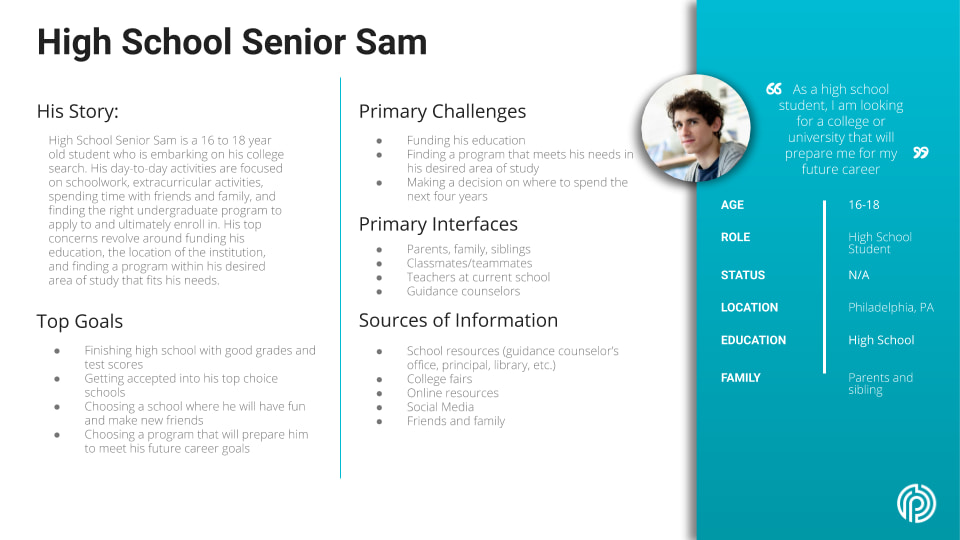
Sample persona: High School Senior Sam is a 16 to 18 year old high school student who is embarking on his college search. His day-to-day activities are focused on schoolwork, extracurricular activities, spending time with friends and family, and finding the right undergraduate program to apply to and ultimately enroll in. His top concerns revolve around funding his education, the location of the institution, and finding a program within his desired area of study that fits his needs. He likely seeks information from school resources like his guidance counselor, as well as from college fairs, social media, and his own online research.
2. The Transfer Student
A transfer student has started their educational journey elsewhere and is looking to finish their degree at a different college or university. This could include a student who is attending a community college or even one who has already completed an associates degree and wants to convert it into a bachelor’s degree at a four-year college. If you’re developing a persona to represent transfer students, consider any feeder schools from which students often transfer to your school from.
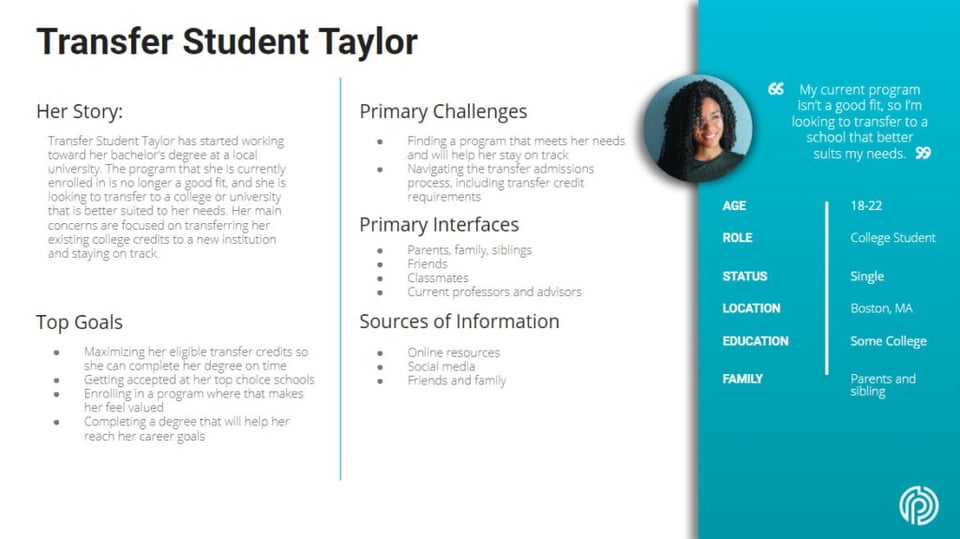
Sample persona: Transfer Student Taylor has started working toward her bachelor’s degree at a local university. The program that she is currently enrolled in is no longer a good fit, and she is looking to transfer to a college or university that is better suited to her needs. Her main concerns are focused on transferring her existing college credits to a new institution and staying on track. As a transfer student looking for a new university, she is more likely to lean into independent online research and recommendations from family and friends than she is to attend an event like a college fair.
3. The Second Career Student
It’s no secret that so-called “non-traditional” students have become more prevalent over the years. One such type of student is what we call the second career student.
A second career student is someone who already has a bachelor’s degree in one field of study, and who is in pursuit of another bachelor’s degree or a graduate degree in a different field of study so that they can pivot their career. These students tend to be a bit older and have several years of experience working in the field. Their primary goal is to advance their education in order to successfully make a career change.
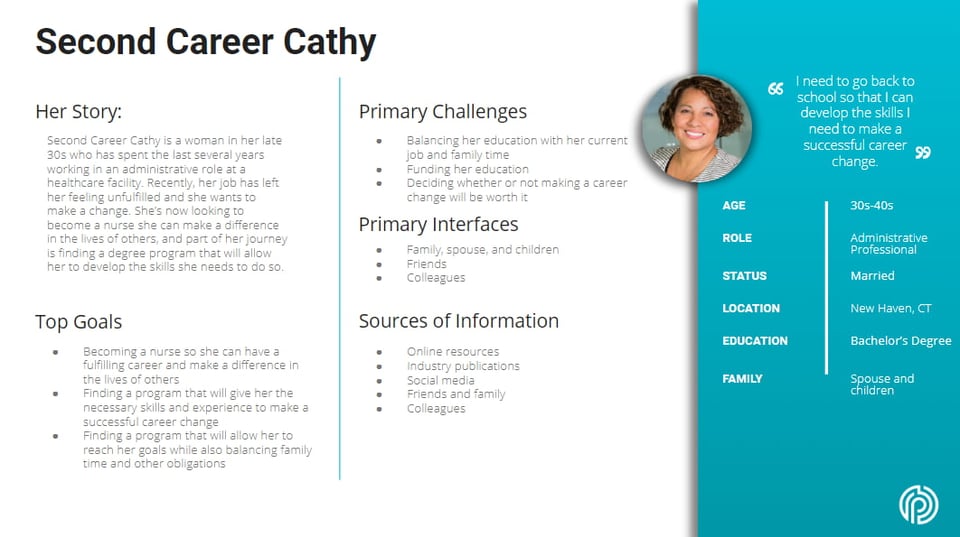
Sample persona: Second Career Cathy is a woman in her late 30s who has spent the last several years working in an administrative role at a healthcare facility. Recently, her job has left her feeling unfulfilled and she wants to make a change. She’s now looking to become a nurse so she can make a difference in the lives of others, and part of her journey is finding a degree program that will allow her to develop the skills she needs to do so.
4. The Learning Parent
Another type of student you will likely encounter is learning parents. Just like the name implies, these are students who are working towards earning an undergraduate or graduate degree while also raising children. Their actions are often driven by the need or desire to provide for their families. They may be working toward earning their first degree, or may be considering an advanced degree.
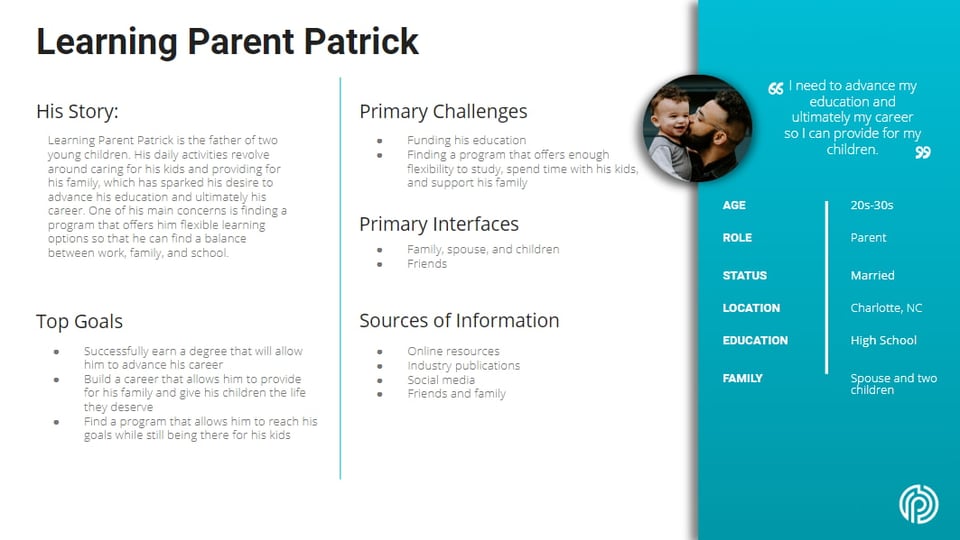
Sample persona: Learning Parent Patrick is the father of two young children. His daily activities revolve around caring for his kids and providing for his family, which has sparked his desire to advance his education and ultimately his career. One of his main concerns is finding a program that offers him flexible learning options so that he can find a balance between work, family, and school. In addition to online research, he is likely to seek advice from family, friends, and colleagues who have successfully gone through a similar transition.
5. The Working Student
Similar to learning parents, working students are drawn to institutions that fit their lifestyle and offer flexible learning options so that they can balance full-time professional obligations with their academics. These students are often looking for opportunities to expand their skills and knowledge in order to advance their careers.
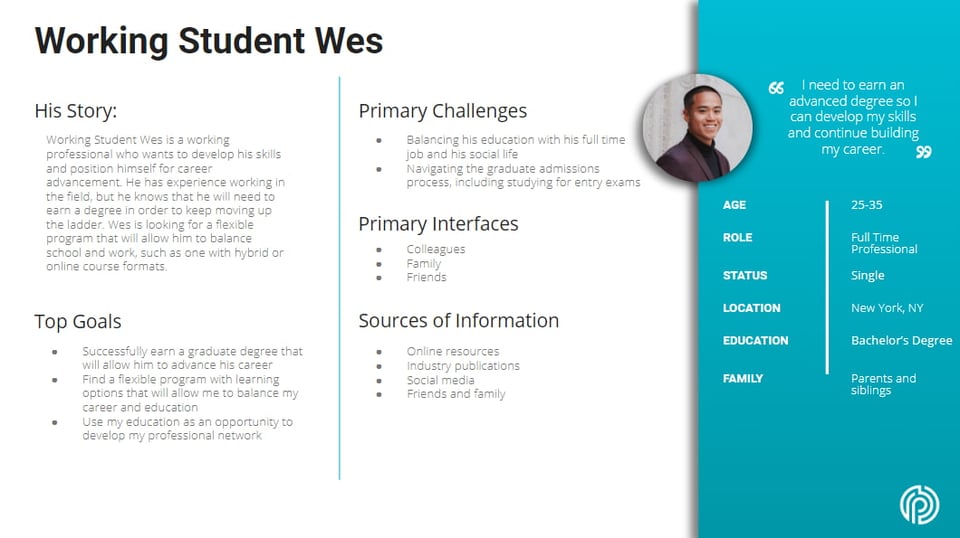
Sample persona: Working Student Wes is a working professional who wants to develop his skills and position himself for career advancement. He has experience working in the field, but he knows that he will need to earn a degree in order to keep moving up the ladder. Wes is looking for a flexible program that will allow him to balance school and work, such as one with hybrid or online course formats.
Developing your Student Personas
In addition to the five student personas outlined above, you will likely discover many different categories of students—and even several variations of each type—that your college or university can serve.
Remember that your research will uncover a wealth of information about each type of student that you’re trying to reach, and the personas you create don’t have to be limited. And, as you continuously learn more about the students that you serve, be sure to revisit your personas and make revisions as necessary.
If you’ve already compiled your research, get started by downloading our free student persona toolkit below. Or, if you’re not quite ready, read our resources detailing everything you need to know about student personas and feel free to reach out with any questions.




